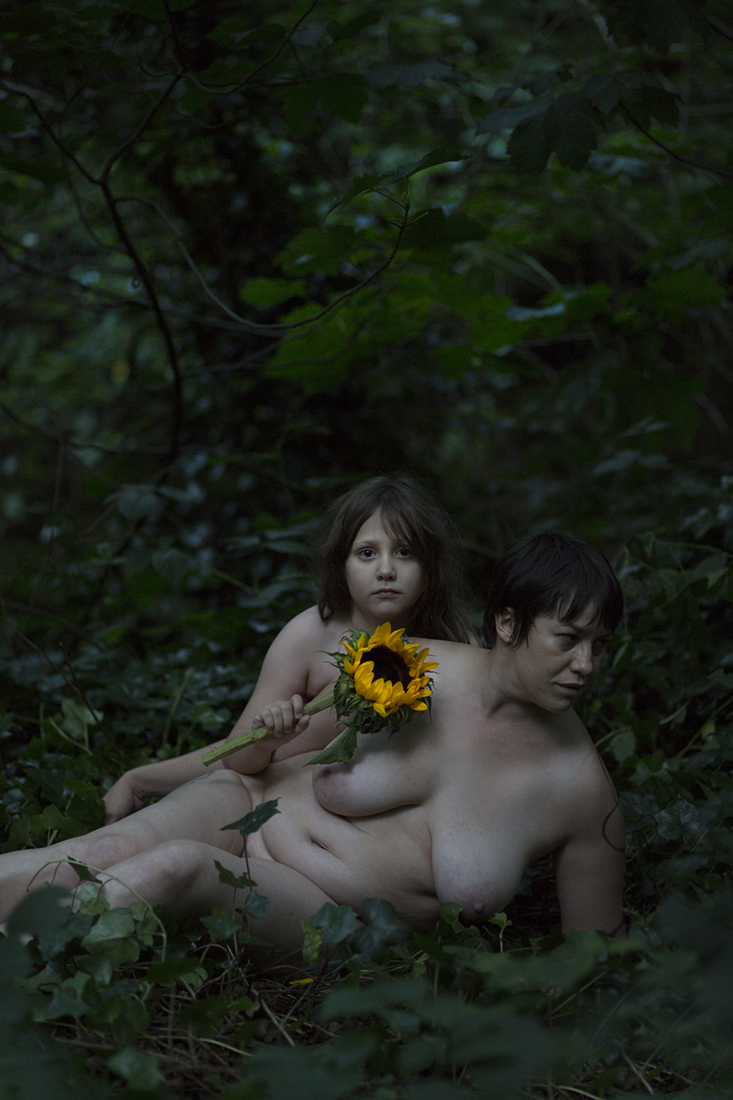Body - NOMINEE: Jannica Honey
Jannica Honey
When The Blackbird Sings
Support this photographer - share this work on Facebook.
When the Blackbird Sings (2016-2017) focuses on the female body and its links with nature.
The compelling works depict naked women of all ages as well as poetic shots of flowers in water. The subjects are family, friends and acquaintances of the artist, always posing outdoors and at twilight. Honey shot the fascinating images over the course of a whole year, exclusively on every full and new moon, starting at the October 2016 Supermoon. When the Blackbird Sings is named after the bird which signals twilight with a song; while shooting the series Honey was stricken by the song’s memento mori-undertones.
The resulting photographs unveil lyrical still lifes alongside delicate moments of tenderness and unashamed femininity, and celebrate the beauty of the female form at any age. While some of the sitters are smiling directly at the camera, others are looking away from it, almost blending into the surrounding setting of moss and trees. The colourful flowers, including daisies and passion flowers, are captured resting on the surface of Edinburgh’s Water of Leith. Honey shot across Scotland and Sweden to illustrate her attachment to both her adoptive and home countries.
Shooting at twilight allowed Honey to challenge the limitations of her chosen medium, in part for the time constraint (twilight only lasts 15-20 minutes), but also for the particular blue hue the light takes on during that time. While most photographers consider it unflattering for theirs subject matter and shy away from it, Honey explores its potential to offer a glimpse of an ephemeral moment in the 24 hour-cycle. When the Blackbird Sings also delves into the significance and symbolism of dusk and explores the ethereal quality of twilight; an in-between moment which doesn’t belong to either day or night, and which Honey sees as an emotional, reflective pause in her day.
When the Blackbird Sings started when Honey felt compelled to reaffirm her own ‘feminine voice’ in the face of personal challenges and male-dominated political events - in particular the recent death of her grandmother and the US elections. By basing her shooting schedule on moon cycles - an intrinsic feminine rhythm - Honey channeled the earth’s natural rhythms into her work, and explored her own reconnection to womanhood and femininity.
About author:
Swedish-born Jannica Honey (Armenian father- Swedish mother) moved to Edinburgh to study photography and digital imaging after completing a BA in Humanities (anthropology & criminology) at Stockholm University 1998.
After building extensive editorial experience as The List Magazine’s in-house photographer, where she shot more than 20 covers and covered the full-spectrum of arts, travel, food and events, she began focusing on more challenging subjects in a series of photo essays. In 2011 Honey spent several months shooting lap dancers in Edinburgh for an exhibition premiered at the city’s Festival Fringe, providing a candid and unusual perspective.
The following winter she visited the Mohawk reservation in Kahnawake (Montreal) portraying residents including chiefs, peace officer and drug dealers. Later that year she returned to her native Stockholm to document the life of a group of ageing amphetamine addicts, a community her recently deceased aunt had belonged to.
In the summer of 2013 Honey was given unprecedented access to photograph the Orange Order’s controversial parade through Glasgow, capturing both the marchers and by-standers.
A significant proportion of her recent work has focused on musicians and politicians (subjects include The Killers, Emma Pollock, Frightened Rabbit, Nicola Sturgeon, Duke of Edinburgh, Dougie MacLean, The Horrors, Young Fathers) with her photographs appearing in The Guardian, LA Times, Aftenposten, Svenska Dagbladet, The Scotsman, the Sunday Herald, Vogue, Dazed & Confused, Tank, Aesthetica Magazine and Gaffa,

